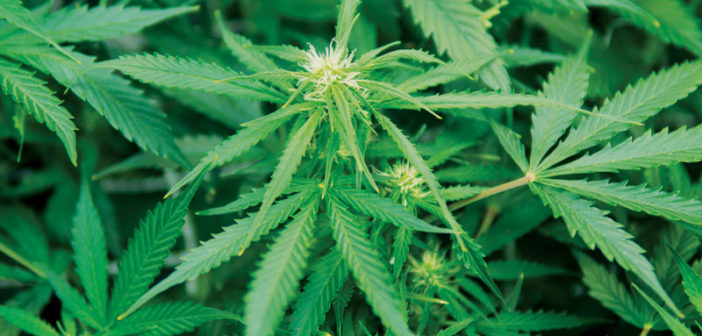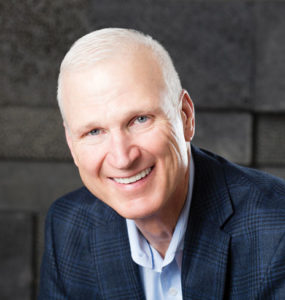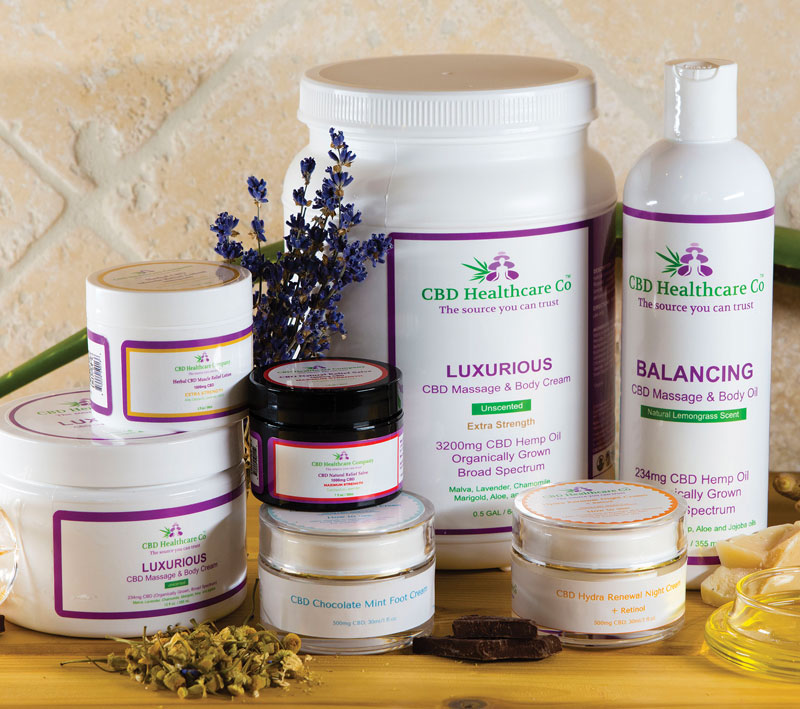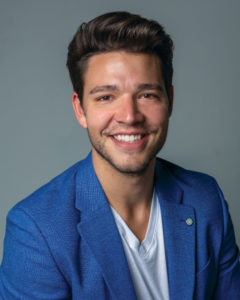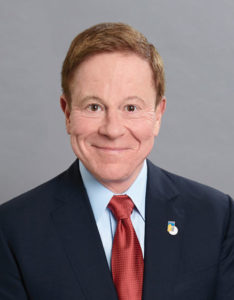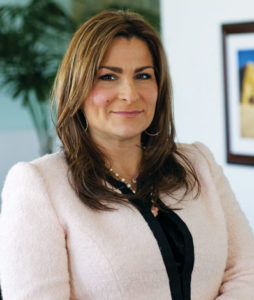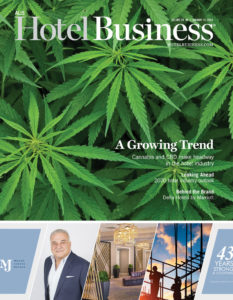A trend, yes; a fad, maybe; a product making its way into hotel doors, without question. As cannabis and CBD become ubiquitous in the hotel space—from CBD-infused massages and cocktails to on-site dispensaries—guests are taking advantage of opportunities to discover and learn. For some, however, cannabis isn’t so much an experiment, but a lifesaver.
“For me, it was very personal,” said Roger Bloss, president/CEO of Alternative Hospitality Inc., a division of MJ Holdings, who used cannabis to combat two life-threatening events. “It had to become a lifestyle change.”
In the summer of 2008 Bloss suffered a widowmaker heart attack, and the following summer, accidentally drove his truck off a cliff, leaving him severely injured.
As a single dad running Vantage Hospitality at the time, Bloss knew opioids and prescription medications were off the table.
“I just knew better; I knew I’d become an addict,” Bloss said. “It would be nothing good for me, so I absolutely refused to do it.”
It wasn’t until about a decade ago, with medicinal marijuana legal in California, that Bloss finally got what he needed: a prescription from his doctor, and much-needed relief.
His comfort was so incredible, in fact, that he built an entire concept around it, launching the first portfolio of health and wellness cannabis-based hotels.
“Obviously, being in the hotel industry my entire life, I realized that so few people knew about the products, and I felt that I could really take them and utilize them in a health and wellness environment,” Bloss said, noting that the hotels will be places of restoration rather than smokehouses. “I can allow people to learn about the products and how they can best be used in their bodies. That just can’t be done in a retail outlet over a five-minute conversation.”
The Coachill Inn Resort in Desert Hot Springs, CA, will be the first of Bloss’ eight properties currently under development, set to open by the end of the year with opportunities for on-site product education.
“As things changed across the country, I saw a real opportunity to do what I do best in the industry: Take a product that has been so beneficial and underused, and used sometimes without much knowledge, and shed some light on it,” Bloss said. “Today, everyone wants to know what’s going into their body. As this becomes legal across the country, more and more people will be able to be exposed to it, so for us it’s a great thing.”
On this journey with Bloss is Bill Monroe, founder/CEO of Monroe’s Honest Hemp Co., the supplier and distributor of all of the CBD and hemp products for the hotels. Not only does Monroe share this mission with Bloss, he also shares a similar story.
“My first introduction to cannabis—aside from being around it with my older brothers in Michigan when I grew up—was when I got into a snowmobile accident at 15; it was a life-changing experience,” Monroe recalled.
After breaking both arms, both legs and suffering from some internal damage, the recovery process was not only slow for Monroe but painful—that was until he had the same epiphany as Bloss.
“My older brother got me stoned during my recovery for the first time officially—minus the contact high from when I was younger—and I slept through some really tough nights during my recovery, which was about a four-month process,” Monroe said.
In 2008, when Michigan passed its medical marijuana laws, Monroe got his patient card.
“I began growing cannabis, and ultimately dropped out of college to pursue a couple of entrepreneurial interests, including cannabis,” Monroe said. “Now, I’m going on 11 years in the industry.”
About four years ago, Monroe switched his focus from cannabis and THC to hemp and CBD, making consumables for both humans and animals, with his sights set on much more.
“The joint vision that Roger and I have—no pun intended—with hospitality is really changing the landscape of cannabis hotels entirely,” Monroe said.
The two hope for cannabis hotels to be built on hemp—quite literally—with hemp in the foundation, hemp sheets and carpets in the guestrooms, and fixtures made from sustainable, durable hemp material. On the consumable side, Monroe expects cafés and shops carrying cannabis products.
Bloss added that while cannabis and CBD are especially popular with baby boomers who are already accustomed to taking medical supplements, every demographic seeks a wellness experience.
“Think of the coolest wine tour you’ve ever heard of in the world and just change the grape to a bud… That’s what we’re doing,” Bloss said.
The inaugural property will have everything from an amphitheater to a sports park, making it a health and wellness destination above all.
“People are going to get a whole experience out of this,” Bloss said. “People ask me all the time if they’ll be allowed to smoke anywhere, but there will be designated areas and people will have balconies. If you think you’re going to walk into the hotel lobby and smell marijuana, not at all—just like you wouldn’t walk into a lobby of a resort at a winery and see people stomping on grapes.”
Keeping the resort health and wellness-focused also keeps it sustainable in the sense that it will remain flexible as laws change.
“At some point in my lifetime, this product will be legal,” Bloss said. “So how do you build a business on something that’s going to change as the states change and the federal government changes? That’s why the hotel is a resort; it’s about health and wellness because I need to have a business that’s going to last the length of my mortgage, minimally.”
Guests can rest assured that they won’t be hotboxed at their hotel either, especially in public spaces like lobbies.
“Smoking marijuana is prohibited anywhere that smoking is prohibited in general; in many hotels, that is pretty much everywhere,” said Jim Butler, chairman, global hospitality group, Jeffer Mangels Butler & Mitchell LLP, a law firm based in Los Angeles, and one that recently added a cannabis division.
Butler added, “Although there have been repeated proposals to remove marijuana from the federal list of Schedule 1 controlled substances, even in states where cannabis is legal, federal agents can confiscate the product and make arrests. No one wants that happening at their hotel.”
Hotel leaders should proceed with caution no matter their geographic location, and Butler advises hotel clients not to get involved in cannabis or CBD in any way without getting legal advice first, as well as throughout their involvement.
“Although proposals are continually being offered to solve the problem, most banks with FDIC insurance will not do business with establishments involved with cannabis, as long as it is a Schedule 1 substance,” Butler said. “Hotel owners, like all business owners, need banks for conducting day-to-day operations, as well as for ongoing credit needs. Who is willing to give up banking and go to an all-cash system?”
The industry is still in the early and very cautious stages of exploring the trend, but it surely seems that while growth is slow, it’s rising consistently.
“Right now, so many people are saying, ‘I want to stay away until everything’s just perfect,’ but that can take forever,” Bloss said. “I think most people don’t know what their responsibilities are. It’s just a business decision.”
Bloss recalled a Vantage conference a few years ago, where he was approached by franchisees in Colorado about the proper steps to take in areas where cannabis is fully legal at the state level.
“I told her, [a franchisee], ‘You follow your local ordinance,’ and she said, ‘But I don’t want smoking in my hotel.’ I said, ‘That’s fine, you just designate it as a non-smoking hotel,’” Bloss said.
Butler added that the regulatory environment is exceedingly complex and that rules differ from state to state and city to city (and can change when new councilmembers, supervisors and governors are elected).
“If you have cannabis hotels in more than one jurisdiction, you will need separate policies and procedures in each locale,” Butler said.
At the property level, others suggest thoroughly educating and training staff, teaching them possible signs of impairment and what to do in the event a guest needs medical attention.
“I like to use a paradigm with which both the staff and guests are more familiar: alcohol,” said labor and employment lawyer Michelle Lee Flores, based in Hollywood, CA. “Although drinks have general ‘alcohol by volume’ numbers that help understand how ‘strong’ the drink will be, it would be impossible for a bartender to be able to tell a guest exactly how a particular drink will make them feel.”
She also advises hotel staff to guard themselves against impairment by wearing gloves during spa services and being cautious of secondhand smoke.
“Although a staff member working at such a property might welcome this ‘side-effect’ of their job, it poses a challenge for employers to enforce a ‘no impairment in the workplace’ policy (a.k.a. drug and alcohol policy),” she added. “It also poses concerns and potential liability for such effects continuing to illegally impair an employee after leaving the workplace. Certainly, disclosure and acknowledgment of what a worker may be exposed to at the workplace in light of the business operations is a good start.”
As more law firms add divisions dedicated to cannabis and CBD protection, more entities—ones far beyond hotels—are feeling increasingly secure introducing these products.
She said, for example, far beyond the manufacturing and retail sales side, there’s now assistance in banking needs unique to the industry and employment-related issues that arise in states where cannabis is legal.
“Until they had a clearer picture of what they were doing, many large corporations—everything from banking to hospitality to major retail chains—have been very leery and getting mixed signals from their legal counsel and pressure to put product on shelves,” Monroe said. “It’s been a dance back and forth, but now we have a framework that’s workable, which is why we’re seeing more adoption from larger publicly traded companies, for example. They’re able to put product on their shelves and move it forward.”
And now, hotel properties—although not all completely cannabis-focused—are adding these products to their list of amenities.
“Aside from an obvious new revenue stream, the benefit of being on-trend with products your guests want or will want, especially when you are early to market with them, creates another distinction in your brand that keeps you competitive,” said Grant Gedemer, area director of food and beverage at The Godfrey Hotel Chicago, which recently added CBD-infused gummies to its minibar offerings.
“I believe we will see greater incorporation of CBD products in hotels. I don’t know that we will see cannabis-driven properties in the near future. I can’t really imagine what that would look like other than a later checkout time,” Gedemer quipped.
Other hotels have seen the benefit of early market entry, like Hotel G in San Francisco, which offers cannabis delivery for guests.
“Once legalized, we took the necessary time to vet the laws, understand what cannabis users wanted in the form of a recreational substance and learn the pros and cons of offering this service. We partnered with Ona.Life, a delivery service that is viable and reliable,” said Steve Rizzo, general manager at Hotel G.
Guests at Hotel G see a menu in their room with detailed descriptions, disclaimers and directions for use. They can then email or text the team at Ona.Life with their order, which is then delivered to the hotel lobby, where they meet the driver to present ID and pick up their products.
“There will be those guests who do abuse the system, as with any other form of a drug. I would prefer a cannabis user, though, to an intoxicated guest any day of the week,” Rizzo said. “My biggest concern is that guests who have not used cannabis and first-timers might overindulge and become too impaired and not know what to do.”
Rizzo said he wasn’t receptive to the trend at first, but after educating himself, he had a clearer understanding of dosages and the differences between CBD and THC.
“What we’re not talking about is the healing aspect of all of this; we seem to be focused on the THC effects,” Rizzo said. “What also needs to be part of the conversation is that the true purpose of CBD is for medical reasons. People with cancer, epilepsy, arthritis, migraine headaches, etc., have greatly benefited from having access to CBD. Guests aren’t always after the ‘high’; rather, they might want to find a form of CBD that has healing properties that truly work for them where they can’t readily have access to this.”
Ona.Life has also partnered with the Palace Hotel in San Francisco, with plans to expand its hospitality services.
“Guests don’t need to run around San Francisco looking for a dispensary,” said Nurit Raphael, owner/founder of Ona.Life. “Instead, they can simply make a phone call, get any questions answered and then get their cannabis delivered directly to the hotel. Cannabis legalization has made tourism for cannabis hit an all-time high. It all goes hand in hand—a cannabis concierge providing the hotel guest with exactly what he or she wants.”
Alongside consumables, CBD is well integrated into hotel spas, but the same inconclusiveness still pervades, warranting caution.
“With all the accelerating hype around CBD, confusion with THC/cannabis and conflicting federal/state laws along with production quality issues, I think it’s important from an authenticity position to be well-grounded in facts vs. trends,” said Jim Root, director of well-being, Enchantment Group—Hotels, Resorts and Spas.
One of these distinctions is that CBD is not cannabis, but rather, derived from the hemp plant, and is now federally legal as per the 2018 Farm Bill. And so, more and more people are discovering its uses, especially in the health and wellness space.
“Hemp cultivation had been legal in the U.S. and was a vibrant cash crop until outlawed with the Controlled Substance Act of 1970,” Root added. “Because of this, necessary research had been stymied and is only now ramping up to document the benefits and process of CBD, cannabis and other plant-derived medicines.”
CBD massage oils are an easy point of entry for hotels, Root said, built around relieving stress and anxiety, especially as many people are already aware of CBD’s uses at home.
“Just like the industry, the same hype/misinformation is in the general marketplace with overreaching claims, which becomes a huge opportunity to be a reliable source of good information and another reason for guest loyalty,” Root said.
CBD Healthcare Company is one of the sources hoping to increase this reliability, a company that recently launched professional-grade topical products with transparent third-party testing for spas. These include massage, analgesic and skincare products, all with a higher concentration of CBD hemp oil.
The company has already been approved as a vendor with a national hotel chain to be announced later this year, with Massage Warehouse and ScripHessco currently carrying and selling its complete line of products directly to the industry.
“With a wide range of unregulated products on the market that are often misrepresented, it comes down to finding the source you can trust,” said Tom Wellman, president of CBD Healthcare Company. “It’s important for operators to consider the type of CBD and most effective concentrations for their needs, along with identifying a credible source that provides Certificates of Analysis to prove their claims.”
According to Wellman, the company provides a QR code on each product, showing Certificates of Analysis and the full profile of the CBD including testing for pesticides, heavy metals and more. Although these may ease operators’ concerns, it doesn’t alleviate lingering CBD skepticism.
“Initially, there was a widespread misconception that CBD is psychoactive. It is not psychoactive. As misconceptions diminish through education, guests are pushing hotels to bring in CBD products,” Wellman said, adding that another misconception is that all CBD is created equal, which it’s not.
“Professionals and consumers are just beginning to learn about the difference between CBD isolate, full-spectrum or broad-spectrum and its applications, as well as the importance of an effective dose,” Wellman said.
These products work well in hotel spas, Wellman said, because of the higher concentration of CBD without the masking agents that other products use to compensate for the lower amounts of CBD.
“We’re also known for providing a wonderful alternative to analgesic products that mask pain relief with camphor or menthol,” Wellman added.
With these wellness amenities, Monroe’s Honest Hemp Co.’s founder/CEO also expects CBD to become even more of a commonplace food ingredient, especially after establishing a comfort level from legal counsel.
“It’s still a gray area and we need to make a decision: Are we getting into it yet or are we going to wait?” Monroe said. “CBD is one of those ingredients that 10 years from now, it’s going to be like sugar or salt. It will be in 90% of every product that you can think of.”
And, Monroe said, as disposable income becomes more readily available, consumers may be more willing to buy supplements and try CBD in formats that they’re comfortable with.
“No matter your age or composition, people have sleepless nights, people have tired mornings, people are sore from working out, no matter if you’re 60 or 21,” Monroe said. “Having a product in the hotel room or gift shop that they can grab post-workout recovery, as a sleep aid or as an energy supplement with CBD in it, these are all functional products.”
Monroe recognizes that it’s only a matter of time before it opens up, with some early adopters and innovators, and then a major wave as it becomes more normalized.
According to Patrick Berwald, VP of F&B for Benchmark, cannabis and CBD’s entry into food and beverage offers a new way to pique guests’ interest, with unique product solutions that could drive untapped, incremental revenues.
“I believe it’s here to stay based on the increasing need to remain relevant with customer demand for the product,” Berwald said. “It’s also a unique way to engage guests—tapping into creative applications for wellness and relaxation.”
Berwald added that the only real challenge for the hospitality industry is educating consumers about cannabis and CBD’s benefits and versatility.
Alternative Hospitality’s Bloss agreed these products will continue gaining momentum, and with the hospitality industry’s “follow the leader” mentality, more and more people will take a good look at this offering and enter local markets when appropriate.
“I don’t see a Marriott adopting it [as a standard]brand-wide, but I do see, down the road, brands that are large and established, they’ll probably allow it to be done,” Bloss said. “You’ll see it on a global scale, but not brand-wide. Just like you’re not required to have liquor in all of your hotels, it’s going to be a decision based on where it’s located and the clientele they attract.”
Although the timeline for product integration and substance legalization remains a bit foggy, the demand is certainly there, sparking more education about their uses.
According to Bloss, it comes down to everyone becoming knowledgeable about how the products work.
“I’ve never heard any doctors say, ‘Hey, go drink some alcohol, it will help you sleep tonight,’” Bloss said. “That’s the real hurdle in this industry—most people think marijuana is just about getting high.” HB

